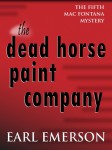Backlist talk and Book #5 in the Mac Fontana Series
At the World Mystery Convention several years ago, also known as Bouchercon, I crashed a party given by St. Martin’s Press. The doors were open and it was a large hall, filled with St. Martin’s authors and other writers, like me, who were accompanied by one or more St. Martin’s authors.
In those days, and probably still today, St. Martin’s had an A-tier route for their top mystery and suspense writers. These very few writers were bestsellers or close to it, and all made a good living writing books. There were also hundreds of St. Martin’s authors writing mysteries for what I call the “Pulp Mill Division.” These writers wrote mostly for libraries and other smaller markets. Writers in the pulp mill could expect anywhere from $5,000 to $10,000 advance against royalties for their books. In most cases, the advances I knew about were closer to $5,000, and many were less. Now if your book hit the bestseller lists, which virtually none of the books in this section of St. Martin’s did, you would earn out your advance and you would start getting royalty checks every six months. But most of the pulp mill authors received their advances happily and then went on to write another book, knowing they were never going to collect any royalties on any of their titles, even though it often took as long as a year to write a book. Five thousand dollars for a year’s work is not very much. In fact, one might argue it’s slave labor. Why did these authors suffer under such a regime?
Because every one of them thought they were going to make it into the A-tier one day. How many of those authors in that room that day made it from the pulp mill to the A-tier? My guess is, none.
So, what you had, essentially, was a room full of authors, none of whom were making a living writing books. In fact, none of them were even coming close, even though many had loyal followings, dedicated mystery readers. The mystery bookstore phenomenon was going strong at the time and there were sales to be had there. Most of the titles went on to sell to a paperback house, generating more revenue for St. Martin’s and sometimes a little more for the author.
In a candid moment probably influenced by too many martinis, the editor-in-chief at St. Martin’s stood up and gave a speech. He said a lot of things, but this is the only part I remember, because it shocked the hell out of me but seemed to shock no one else in the room. He said the genre authors in the room had generated more money for St. Martin’s than all their bestselling writers put together, that the St. Martin’s engine was actually fueled by the people in that room, and not by the writers that were hitting the bestseller lists — startling news, since a bestselling book generates one hell of a lot of revenue for a publisher, as well as for the author. This told me that everybody in the room was being taken advantage of. Not one of the authors in that room was able to quit his or her day job to write full time. Everybody there could have been paid more money. The publisher was making a fortune off them. The editor-in-chief admitted it. In a just, sane world there would have been a riot and the editor-in-chief might have needed bodyguards to get out of the room.
Everybody who wants to be a writer wants to make a living at it. In that room the only people making a living off the craft of writing were the publishers, editors, and agents: the non-writers.
On another note, book five, the last book in the Mac Fontana series, is now on Kindle. You can find it here.






